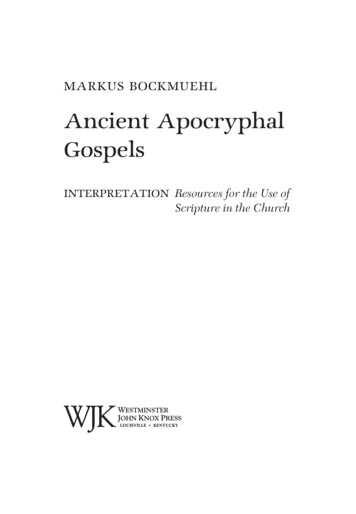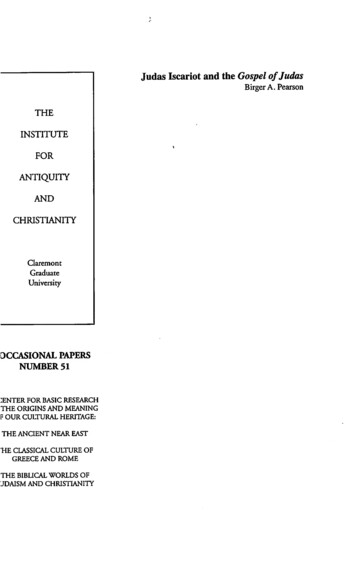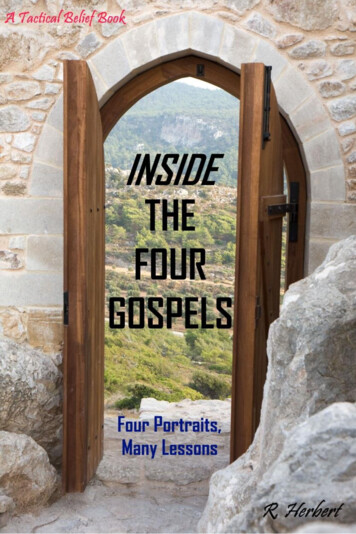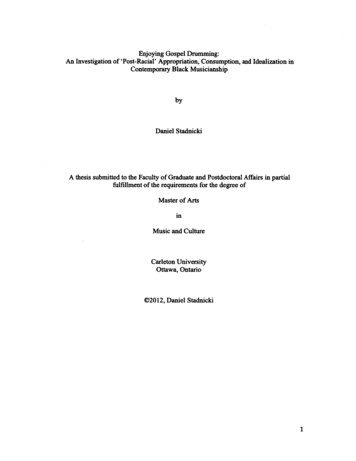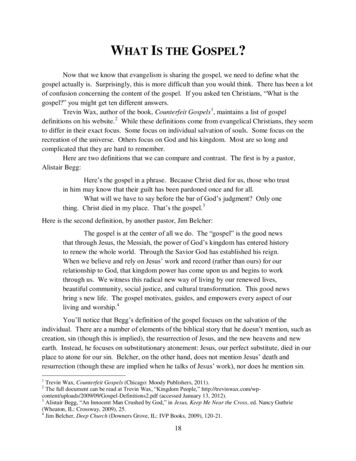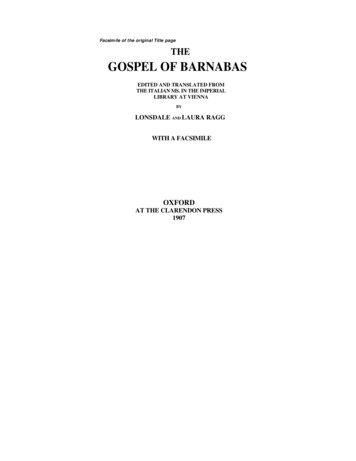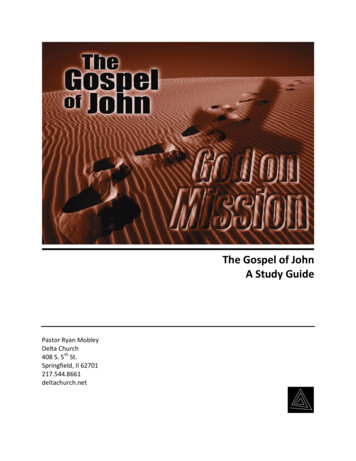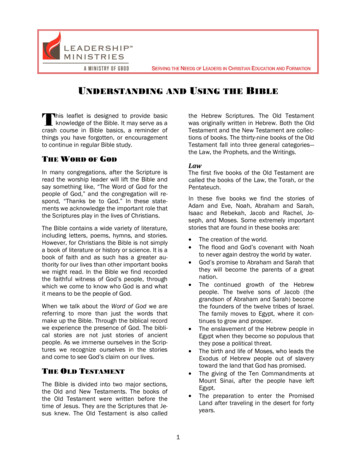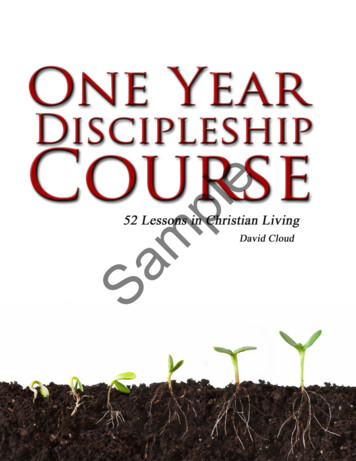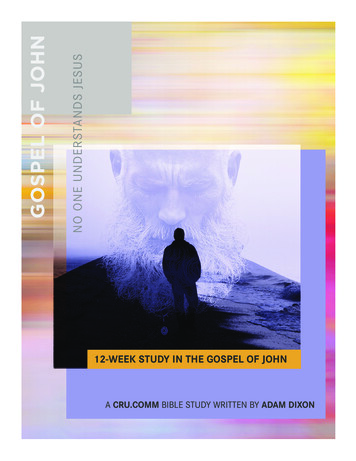
Transcription
GOSPEL OF JOHNNO ONE UNDERSTANDS JESUS12-WEEK STUDY IN THE GOSPEL OF JOHNA CRU.COMM BIBLE STUDY WRITTEN BY ADAM DIXON
5)& 4503: #&(*/4 ϩϭϡϭ What Do I Need to Know About the Passage? PIO : What’s the Big Idea? PIO UIF "QPTUMFPeter, James, and John were Jesus' primary disciples. They saw the transfiguration(Mk. 9;2-13) and he took them places he didn't take anyone else. He also told themthings that he didn't tell anyone else. But even among them, most people agree thatJohn was the closest one to Jesus. John even called himself "the apostle whom Jesusloved." Here are just a couple examples of John's relationship to Jesus.The first 18 verses of John'sGospel (often called theprologue) are not just anintroduction to John's Gospel.They summarize his wholemessage.: "The Word becameflesh!" This is the greatest newsthe world has ever known!(1) Consider how this scene from the last supper unfolds:i"GUFS TBZJOH UIFTF UIJOHT FTVT XBT USPVCMFE JO IJT TQJSJU BOE UFTUJGJFE i5SVMZ USVMZ * TBZ UP ZPV POF PG ZPV XJMM CFUSBZ NF w 5IF EJTDJQMFT MPPLFE BU POF BOPUIFS VODFSUBJO PG XIPN IF TQPLF 0OF PG IJT EJTDJQMFT XIPN FTVT MPWFE XBT SFDMJOJOH BU UBCMF BU FTVT TJEF TP 4JNPO 1FUFS NPUJPOFE UP IJN UP BTL FTVT PG XIPN IF XBT TQFBLJOH 4P UIBU EJTDJQMF MFBOJOH CBDL BHBJOTU FTVT TBJE UP IJN i-PSE XIP JT JU w FTVT BOTXFSFE i*U JT IF UP XIPN * XJMM HJWF UIJT NPSTFM PG CSFBE XIFO * IBWF EJQQFE JU w 4P XIFO IF IBE EJQQFE UIF NPSTFM IF HBWF JU UP VEBT UIF TPO PG 4JNPO *TDBSJPU w John was leaning on Jesus' chest during this meal. And Peter, knowing thatJesus would tell John what he meant, prompted John to ask Jesus who wouldbetray him. And Jesus told him.(2) Consider this scene from the cross:i TUBOEJOH CZ UIF DSPTT PG FTVT XFSF IJT NPUIFS BOE IJT NPUIFS T TJTUFS .BSZ UIF XJGF PG MPQBT BOE .BSZ .BHEBMFOF 8IFO FTVT TBX IJT NPUIFS BOE UIF EJTDJQMF XIPN IF MPWFE TUBOEJOH OFBSCZ IF TBJE UP IJT NPUIFS i8PNBO CFIPME ZPVS TPO w 5IFO IF TBJE UP UIF EJTDJQMF i#FIPME ZPVS NPUIFS w "OE GSPN UIBU IPVS UIF EJTDJQMF UPPL IFS UP IJT PXO IPNF wThe Book of JohnJesus loves everybody. But John was his closest friend. And John's gospel is verydistinct. The other gospels all describe Jesus' heritage from an earthly perspective,John, in contrast, doesn't start with his ministry, his parents, or John the Baptist.He describes Jesus' eternal pre-existence. John calls him the ϩϭϡϭ (logos) ofGod. Continued on page 2What’s the Problem?Many people don't knowwho Jesus is, or recognizehow much they need aSavior.
ϩϭϡϭ PIO John's opening words, "In the beginning," are a reference back to Genesis 1:1.Genesis reads, "In the beginning God created the heavens and Earth." John says,"In the beginning the Word was with God and the Word was God." The Greekterm translated "Word" in this passage is ϩϭϡϭ (logos).ϩϭϡϭϯ MPHPTScholars have done a ton of research on that word. It's a Greek word with anumber of Greek nuances but John is using it in a Hebrew way. Basically, what itmeans is "expression." Jesus is the expression of God to us. To use a quote fromD.A. Carson, Jesus is God's ultimate self-disclosure, the Person Who is His ownSon. In other words, if you want to see what God is like, just look at Jesus.Instead of talking about Jesus' earthly heritage, John goes straight to His preexistance. Jesus worked alongside God the Father and the Spirit to create the world.People often say that Jesus was the Agent of Creation. Hebrews 1:2 is a greatparallel verse. It says that "in these last days, (God) has spoken to us through HisSon, through Whom He created the world." Another great parallel is verse is 2Corinthians 4:6, "For God who said, 'Let light shine out of darkness, has shone in ourhearts to give us the light of the knowledge of the glory of God in the face of Christ."John 1:6-18Verses 6-18 discuss John the Baptist, the fore-runner sent to prepare the way for theMessiah (see Malachi 3:1 and Isaiah 40:3). John proclaimed that Jesus was the light ofthe world.A Fallen-Condition Focus - Verses 5 and 10-11Look closely at verse 5. John the Apostle says that Jesus is the light of the world, butdarkness has not overcome him. Look also at verses 10-11. Though Jesus made theworld and came into the world, the world did not recognize him. That's the dramaof the book of John. You'll see it in every study. Though Jesus is the Son of God,no-one recognizes it. No-one understands Jesus. As you lead this study you'll wantto be sensitive to this theme. You'll want to share Jesus with those who haven'ttrusted Him, and you'll want to encourage those who have placed their trust in Jesusto continue to trust Him daily.Back to John 1:6-18Jesus brings light and life to all who receive him. Be sure to answer the Bible studyquestions yourself before leading this study, and consider how Jesus has brought lifeand light to you. In verses 12-13, John says that all who receive Jesus, who "believein his name," become children of God. Invite your group members to put theirtrust in Jesus. A great parallel verse for this section os 2 Corinthians 5:17, "Ifanyone is in Christ, he is a new creation. The old has passed away, behold, thenew has come."John describes Jesus' glory as being full of grace and truth. Jesus is absolutelygracious, and he fulfills the Law of truth. Sometimes people who abandon truth andfall into licentioiusness (sin) call it " grace." Others abandon grace and fall intolegalism and they call it "truth." Sin and legalism are perversions of grace and truth.Jesus is the real deal. He's 100% grace and 100% truth at the same time. He's justthat good.Theologians have also noted that Jesus is 100% God and 100% man at the sametime. He's not part-God and part-man. He's not God sometimes and man othertimes. He's 100% of both, all the time. That's the incarnation. In the words ofGregory of Nanzianus (4th century) "What is not assumed is not healed." Jesus,who is God's Son, became a man to redeem mankind.EndIn this study you want to helpyour group understand thatJesus is fully God and fully man,and that he brings life and lightto those who trust him.
ϩϭϡϭ John 1:1-18LAUNCHWhat are some things you hope to get out of this bible study?EXPLORERead 1:1-5.1. What do you think John meant when he called Jesus"the Word?"2. In John 1:1-3, what things does John declare tobe true of the Word? Why is each of these factssignificant?3. This passage includes several allusions to creation.Look up Hebrews 1:2 and 2 Corinthians 4:6. Whatdo you see?4. What do the symbols of life and light tell us aboutJesus? How has he brought these qualities into yourlife?Read 1:6-18.5. Who is the "man sent from God" in verse 6? Whatdid he come to do?6. John contrasts Jesus' rejection by the majority withhis reception by a few (verses 9-13). Have thingschanged today? Why or why not? What does thattell us about the condition of the human heart?7. What does it mean to receive Jesus? What are theresults of receiving Jesus (vs. 12-13)?8. According to John 1:14-18, what aspects of God'scharacter has Jesus revealed to us?9. Why do we need both grace and truth? Whentruth is missing, what's the result? When grace ismissing, what's the result?10. Is there such a thing as too much grace or too muchtruth?11. Verse 14 says, "The Word became flesh." Which ofthese statements accurately describes Jesus?A. He is 100% God and 100% manB. He is 50% God and 50% manC. Sometimes he is God and sometimes he is man12. Why is it important that Jesus is both man andGod?APPLY13. What has been your experience of Jesus up untilnow?15. Do you lean more toward license or legalism whenyou struggle with sin?14. Did you learn anything new about Jesus from thisstudy? What are some things that you love aboutJesus?16. Was there a time in your life where you began tofollow Jesus?
ϩϭϡϭ 1. When John called Jesus "theWord," he used the Greekword ϩϭϡϭϯ (logos). He wassaying that Jesus is the fullexpression of God to us. He isGod's Son.2. "He was in the beginning." Jesushas existed forever. "He waswith God." Jesus is God's Son."The Word was God." Jesusand God the Father are one inessence, but distinct in person."All things were made throughhim." Jesus was the Agent ofCreation.3. Consider how these versesinform John 1:1-3.4. Encourage the group to share.5. John the Baptist. Look up Malichi3:1 and Isaiah 40:3.6. In Jesus' day, some peoplereceived him and followed him,but most rejected him. Fewpeople really understood who heis. Similarly, many people do notfollow Jesus today.7. Notice how the phrase "believedin his name" parallels "those whodid receive him" in verse 12. Toreceive Jesus is to believe in hisname. This is not simpleintellectual understanding. Itinvolves the heart. To believe inJesus is to trust in Jesus.8. Synonyms for grace include love,mercy, kindness and unmeritedfavor. Truth is similar torighteousness and purity.9. The definition of licentiousness is:"lacking legal or moral restraints."Sin results when truth is ignored.But that's not our only potentialproblem. Another type of sin,legalism, results when grace isignored. Legalism is an overconfidence in one's personalrighteousness and a tendency tocondemn others.But to all who did receivehim, who believed in hisname, he gave the right tobecome the children of God.John 1:1210. Not really. It's the absence ofeither one that's the problem.Jesus is 100% both.11. Option A is the correct one.Options B and C are ancientheresies. John 1:1 speaks of Jesus'divinity. Verse 14 speaks of hishumanity.12. Jesus had to become man toredeem mankind. To quote a 4thCentury theologian, "What is notassumed is not healed." See the"What do I need to know aboutthis passage" section. Jesus is alsoGod. And he demonstrated hisdivinity with his character, histeaching, his miracles, his defeat ofSatan, and his resurrection fromthe dead.13. Encourage the group to share14. Encourage the group to share15. Encourage the group to share16. Encourage the group to shareCru.Comm is the small group material for Campus Crusade for Christ’s Campus ministry. It was created by Centerfield Productions,the field based division of CruPress. We’d love to hear your feedback on this study. Please write us at centerfield@uscm.org 2007 Cru Press, Campus Crusade for Christ, Inc . All rights reserved.No part of this publication may be digitally reproduced, stored in a retrieval system, or transmitted, without the prior permission of Cru Press.
A PRIVATE REVELATION MiraclesWhat Do I Need to Know About the Passage?What’s the Big Idea? PIO The Book of SignsThe book of John naturally falls into two parts. The first part is called The Bookof Signs and it covers three years of Jesus' life. The second part is called TheBook of the Hour and it covers one week. We have no way of knowing howmany miracles John saw Jesus do, but we know which ones he recorded for us:The Book of SignsTurning water into wine (John 2)Healing an official's son (John 4)Healing a lame man (John 5)Feeding 5000 people (John 6)Walking on water (John 6)Healing a blind man (John 9)Raising Lazarus from the dead (John 11)5ISFF ZFBSTThe Book of the HourThe last week of Jesus' life on Earthculminates in his resurrection (John 12-21)0OF 8FFLBackgroundDuring the first few days of Jesus' ministry, he began to choose key disciples fromamong John the Baptist's followers. Jesus' first disciples included Andrew, SimonPeter, Philip, Nathaniel, and John. Today we find them at a wedding.Weddings in the Ancient Near EastIn Jesus' day, weddings were an even bigger deal than they are today. Nowadayscouples often fall in love on their own, but back then it was a family decision.Everyone was involved, and everyone needed to be satisfied. Parents had to agreewith the courtship, and the ceremony was quite elaborate. When the special daycame, the bride would get ready in her house and her attendants would positionthemselves outside the home to await the coming of the groom. The groomwould come from an unknown place at an unknown time. At some point someonewould see him and yell, "Behold, the bridegroom comes!" And everyone wouldrush out to join him as he came to pick up his bride. As the procession neareddoor of the house, someone yelled "Behold, the bridegroom is here!" Thewedding party entered the house and literally picked up the bride and carrried herto the groom's house, celebrating all the way. Once they got to the groom'shouse, the doors were shut and the couple went into a back room to consumatethe marriage. When they came out, the party began, and it often lasted sevendays.Continued on page 2On the seventh day afterbeginning his ministry, Jesusrevealed himself as theCreator.What’s the Problem?We need God to deliver us fromour inadequacy, scandals, andshame.
.*3" -&4If you want to understand this passage, it's important to note that marriages at thistime were very public ceremonies that had that had two key components. Whathappened in the back room affirmed the bride's purity, and the grandeur of the partyaffirmed the grooms fidelity and ability to provide for her. Everything had to go well.The groom and his family were responsible to demonstrate their ability to provideand care for the girl who had just consumated her marriage to this man. To fail tohost a good party wasn't just embarassing, it was illegal.John 2:1-5This passage tells us that not only was Jesus' mother invited to this wedding, Jesusand his disciples were invited as well. Scholars have pointed out that Jesus' motherwas probably a member of the wedding party. In this passage she (1) told theservants what to do, (2) knew about the crisis of the wine before the master of thefeast, and (3) had concern for how the event was going.Because of the nature of the culture in the Ancient Near East, running out of winewas a big deal at a wedding. The bride's family could sue for damages in such asituation, and the new marriage would start off on rocky ground.Mary and JesusWhat would it like to be the mother of Jesus? Scholars generally agree that Jesushadn't grown up doing miracles. But he wasn't an average kid either. An angelannounced his birth. Mary was a virgin when he was born. God promised Marythat her son would sit on the throne of David. King Herod tried to kill him, etc.She's seen some stuff. And when there's potential for this party to get disrupted,she turned to her son.Jesus' response was not rude. If you read verse 4 in several translations, you'll seethat it's difficult to translate. Jesus was polite, but he distanced himself from hismom's request. Notice how she responded to the servants, "Do exactly what Jesustells you to do." And don't miss that little phrase, "my hour has not yet come."For the next 8 chapters, John will repeat that phrase over and over again. Then,after a confrontation with Jewish leaders in chapter 12 Jesus will say "the hour hascome," and he'll march straight into Jerusalem to be crucified. Jesus knows thatwhat he's about to do will start the clock ticking on his crucifixion. And he is sosmooth. This, his first miracle, is a private miracle, initially just for his disciples.John 2:6-12The six water jars that John mentions in verse 6 held 20-30 gallons each. Thiswater was for washing the feet and hands of the guests as they arrived. If you wereto re-tell this story in today's terms, you'd see how bizarre it is. Imagine Jesusremoving himself from the party and going through the house poking around untilhe found the hot water heater. It's covered with dust but he knows it's sanitaryinside. He rips it off the pipes, "they won't need it later anyway," and tells theservants to fill it with water then take some to the master of the banquet.The master's response is clearer in the original language than it is in English. Hegrabbed the groom and basically said, "This is the best wine ever! You're the bestgroom in history!" The only people who initially knew what had happened wereJesus, his disciples, and some servants. The value of that wine in today's standardsis easily 20,000 to 60,000. That's a pretty nice wedding gift.Scholars have noted that this wedding occurred 7 days after Jesus began hisministry. Remember what happened on the seventh day of Creation? God gaveEve to Adam, before the curse. And here we have God again, at a wedding, andhe's bringing redemption to our inadequacy and shame.EndIn this study you will want tohelp your group understandthat Jesus' abundant gracefrees us from our scandalsand shame.
.*3" -&4John 2:1-12; 1st John 1:1-4LAUNCHCan you name any of Jesus' miracles from the Bible? If you could be there to see one, which would you choose?EXPLORE Read 2:1-5.1. Why do you think Jesus and his disciples wereinvited to this wedding in Cana? From theseverses, do you think Mary was playing a role inorganizing the wedding feast? . Look at verses 5, 7, and 8. How did Mary and theservants respond to Jesus? What do you thinkthose servants were thinking as they approachedthe master of the banquet?2. Why would running out of wine be such a bigdeal? . Who knew what Jesus had done? At what pointdo we find out the water had become wine?3. When Mary asked Jesus to help, what do you thinkshe was expecting him to do? . What did the banquet master immediately do afterhe tasted the wine? Why? Who did he give creditto? How do you think the groom reacted?4. Was Jesus being rude by calling his mother,"Woman" in verse 4? Why do you think headdressed her that way?5. What did Jesus mean by "My hour has not yetcome" in verse 4?Read 2:6-12.6. What were the water jars normally used for? . Obviously, Jesus could have created wine anyway he chose. In your opinion, why did Jesuscommand those servants to fill those pots withwater?1 . If you were one of the disciples and you saw thishappen, how do you think you would have reacted?1 . John described this as "the first of Jesus' signs."What was it a sign of?Turn to 1st John 1:1-41 . Years after this event, the Apostle John wrotethe letter we call 1st John. According tothese verses, why did he write this letter?1 . At some point later, the groom and everyoneelse realized what had happened at that party.How do you think the groom felt then?APPLY15. This wine in Canaan wasn't Jesus' most recentact of creation. According to 2 Corinthians5:17, what is he still creating today?16. The groom in this story had a "near miss." IfJesus hadn't showed up in time, he was in a badsituation. Has God ever showed up just in timefor you?17. Jesus saved this groom from embarassment andgave him a great blessing. Has Jesus donesomething similar for you? Do you believe hecan?18. The groom was utterly clueless at first. Has Godbeen at work in your life "behind the scenes?"Name some ways that God has blessed you.19. Have you ever struggled to trust Jesus? Howdoes this story challenge you to trust him more?
.*3" -&41. Mary appears to be one of themembers of the wedding partybecause she tells servants whatto do and knows about thewine before the master of thefeast.2. See the "What do I need toknow about this passage"section.3. It's doubtful that Mary wasasking Jesus for a miracle. Hehadn't performed miraclesbefore this point. But she knewthe prophecies about him.4. Jesus was not being rude. But hedid distance himsef from herrequest. Another translationsays, "Dear woman, why do youinvolve me?"5. See also John 7:30, 8:20, and12:23. Jesus' hour is the lastweek of his life- his journey to thecross.6. It's significant that the water wasused for purification. Thiscleansing was required by the OTLaw. Jesus was about to fulfill theLaw for us.7. By using these water jars, Jesuswas able to perform a secretmiracle.9. It appears that only Jesus knewwhat he had done at first. Wedon't even find out until halfwaythrough verse 9.10. He interrupted the feast tocongratulate the groom. This waslikely the best wine he'd evertasted. And the groom probablyhad no idea what was going on. Itwas his wedding day. He was justglad things were going well.Therefore if anyone is inChrist, he is a new creation.The old has passed away;behold, the new has come.2 Corinthians 5:1711. Discuss12. Jesus revealed himself as theCreator through this miracle.13. Years after he walked with Jesus,the Apostle John penned thisletter. It's fun to read the Gospelof John and the Letter of John atthe same time. John wrote bothto lead us to Christ.14. The groom must have experienceda lot of emotions! At first heprobably felt like he dodged abullet. Then he realized he had 40,000 in wine on hand. Then herealized a miracle had happened athis wedding.15. Every time someone trusts Christ,He makes them into a newcreation (see the memory verse).16. Encourage the group to share8. Maybe the servants werethinking, “What’s he going to saywhen he tastes washing waterinstead of wine?” Notice howthis miracle slowly unfolds. Ittook no effort whatsoever forJesus to bless a party privately –and privately demonstrate hispower as Creator.17. Encourage the group to share18. Some people have definedChristian maturity as "consciousawareness of God's presenceeverywhere and all the time."19. Encourage the group to shareCru.Comm is the small group material for Campus Crusade for Christ’s Campus ministry. It was created by Centerfield Productions,the field based division of CruPress. We’d love to hear your feedback on this study. Please write us at centerfield@uscm.org 2007 Cru Press, Campus Crusade for Christ, Inc . All rights reserved.No part of this publication may be digitally reproduced, stored in a retrieval system, or transmitted, without the prior permission of Cru Press.
A PRIVATE ONVER ATION rrAeWhat Do I Need to Know About the Passage?What’s the Big Idea? PIO The Gospel of John ContinuesAfter his miracle at the wedding in Cana, Jesus disrupted business at theTemple. He made a whip out of cords and drove out the animals. He turnedover the table of the money changers, dumping out their money. He told them,Do not make my Father's house a house of trade!" His actions prompted aconfrontation with Jewish leaders. Today we're picking up in John 3.The Son of God is the Light ofthe world, and all who look toHim are saved.Background- The History of IsraelIn many ways, the Old Testament era came to a close 400 years before Jesuswas born. By 400 B.C., obedient Jews were returning from exile to rebuildJerusalem. Malachi was prophesying. It was a time of renewal recorded in thebiblical books of Ezra, Nehemiah and Malachi. But it also marks the end of theOld Testament. After Malachi's ministry, prophesy ceased in Israel. God didnot speak for the next 400 years. Theologians call this time period theIntertestimental era.Four Hundred Years of SilenceThe Intertestemenal era (400 B.C - A.D. 1) was a chaotic time for Israel.Various empires competed for domination of the world, and each one ruledIsrael for a period. Persia controlled Israel initally. Then Alexander the Greatcreated a vast empire and Greece ruled Israel. Then Egypt ruled Israel briefly.Then Rome arose, and became the greatest empire in history. Each of theseempires introduced changes to Israel. The Egyptians, for instance, turned theoffice of the High Priest into a political position, and installed a cabinet of rulingofficials called the Sanhedrin. The Greeks aggressively promoted Greek cultureand Greek gods, prompting many Jews to revolt. Rome taxed Israel heavily.Pharisees and the SanhedrinNew types of political and religious leaders arose because of all these changes.By Jesus' day, Pharisees were one of the leading groups. Pharisees werescholars who tried hard to obey the laws in the Old Testament and a dizzyingarray of man-made laws which they added to the Old Testament. The Jewsrespected them and gave them great social, religious and political influence.Pharisees usually took great pride in their positions. Nicodemus, (in thispassage), is also called a "Ruler of the Jews." That means he was also one ofthe elite 70 members of the Sanhedrin, the political / religious body that ruledIsrael. The Sanhedrin ruled under the supervision of Herod, who reporteddirectly to the Roman emperor. A Roman governor and legion were alsostationed in the area.Continued on page 2What’s the Problem?Mankind is in the darkness andoften prefers the darkness tothe light.
#03/ '30. "#07&No-one Understands JesusOne of the key themes of the Gospel of John is how "No-one understandsJesus." As you read, take note of how people misunderstand him. Jesus wasspeaking of his body in John 2 when some Jews thought he was talking aboutthe temple. In this passage, Nicodemas is going to make a similar mistake.In this study you want yourgroup to understand thateveryone who looks to Jesuswill be saved.Words have various meanings, as you know. For instance, the meaning of theword "late" changes drastically according to how it's used in a sentence.Consider these examples: "Sorry I'm late." "The late Mr. Jefferson left hisestate to his daughter."Vs. 1-4 In order to understand Nicodemas' dilemma, you have to knowsomething about a particular Greek word. The word is ЋϫϵϦϣϫ (anothen). Itmeans either "above" or "again." Nicodemas came to Jesus at night for adiscreet conversation, and Jesus got right to the point. Jesus said, "Truly, trulyI say to you, no-one can see God unless he is born ϟɆɐɁȾɆ (anothen)." Whathe probably meant was "born from above." But what Nicodemas heard was"born again." And Nicodemas ran with that interpretation. "How can this be?"he said, "No-one can enter his mother's womb a second time."Vs. 5-8 Jesus told Nicodemas that he was confusing spiritual birth with physicalbirth. And he rebuked Nicodemas, saying, "Are you the teacher of Israel and yetyou do not understand these things?" As a scholar of the Old Testament,Nicodemas should have recognized that Jesus was talking about the work of theSpirit (Isaiah 32:15; Ezekiel 3:25-27; Joel 2:28-29).Nicodemas thought Jesus was just a special teacher. That's a common mistake.In his book Mere Christianity, C.S. Lewis said: “A man who was merely a manand said the sort of things Jesus said, wouldn’t be a great moral teacher. Hewould either be a lunatic on the level with a man who says he’s a poached egg –or else he would be the devil of hell: you must take your choice. Either thiswas, and is, the Son of God, or else a madman or something worse. You canshut Him up for a demon: or you can fall at His feet and call Him Lord and God.But don’t come up with any patronizing nonsense about his being a great moralteacher. He hasn’t left that alternative open to us.”)JT DMBJNT XFSF GBMTF)F LOFX IJT DMBJNT XFSF GBMTF)F EJE OPU LOPX IJT DMBJNT XFSF GBMTF)F XBT B -*"3)F XBT B -6/"5* 5IF MBJNT PG ISJTU 0OMZ (JWF 6T 5IFTF "MUFSOBUJWFT )JT DMBJNT XFSF USVF)F JT -03%Vs. 9-21 Jesus referred to his incarnation in 3:13. And he shared a great imagein verse 14. Be sure to unpack it. Read the story in Numbers 21:4-9 One timewhen the Israelites were being attacked by snakes, God had Moses put a bronzesnake on a pole, and whoever suffered a snakebite could look at that snake andbe healed. Just as Moses lifted that snake up in the wilderness to heal thepeople, Jesus would be lifted up on a cross to bring healing to the world.And don't gloss over John 3:16. It's arguably the best one verse presentation ofthe gospel in the whole Bible and it's your memory verse. You will also visit1st John 5:11-13 briefly. John's epistle corresponds very nicely with his gospel.End
#03/ '30. "#07&John 3:1-21LAUNCHCan you think of a time when you received some important news?EXPLORE Read 3:1-2.1. What do we know about Nicodemas,according to these verses? . Have you ever had a friend who began a newrelationship with God? How would you describethe difference God made in their life?2. What did it mean that he was a Pharisee? . Why was Jesus amazed at Nicodemas' ignorance(vs. 10-12)?3. Why did he come to see Jesus? Why did hecome at night? . What did jesus mean in verses 12-13?4. How did Nicodemas address Jesus? Was hecorrect? Why or why not?Look up Numbers 21:4-91 . What did Jesus claim about himself in verses 14-15?5. If you were to walk up to Jesus today, howwould you greet him?3FBE PIO 1 . Why does our response to God's Son determineour destiny?Read 3:3-15.6. How might you summarize Jesus' response inverse 3? Does it seem weird at first? Whatdoes the image of birth convey? . How did Nicodemas respond in verses 4 and 9?Did he understand what Jesus said? . What did Jesus mean by, "Truly, truly ,I say toyou, unless one is born of water and the Spirit,he cannot enter the kingdom of God"?1 . According to this passage, did Jesus come tocondemn the world? But how do those whoreject Jesus end up?1 . What does the light in verse 19 represent? Howmany times is Jesus called "the light" in this passage?What do verses 20-21 mean?-PPL VQ TU PIO 1 . The same John who wrote this gospel wrote theletter we call 1st John. According to theseverses, why did he write that letter?APPLY17. Do you believe in Christ? Why or why not?does 1st John 5:11-13 bring you comfort?Why or why not?18. Who around you needs to look to Christ?19. What are some reasons people have troublebelieving in Jesus?20. Jesus has already been called "the Light of theworld" a dozen times in John so far. What wouldit look like for you to take some steps away fromdarkness into the light?21. What would it look like for you to lead othersinto the light?
#03/ '30. "#07&1. Nicodemas was a Pharisee anda member of the Sanhedrin.2. See the "What do I need toknow about this passage"section.3. This was obviously a privatemeeting. Nicodemas came tosee Jesus because of hismiracles and because he drovemerchants out of the temple.4. Yes and no. He's a Teacher whocame from God, and God is withhim, but he's much more thanthat as well. He's also the Son ofGod in the flesh! To help yourgroup see what Nicodemas ismissing, you might share the C.S.Lewis quote or the diagram fromthe "What you need to knowabout this passag
Jesus loves everybody. But John was his closest friend. And John's gospel is very distinct. The other gospels all describe Jesus' heritage from an earthly perspective, John, in contrast, doesn't start with his ministry, his parents, or John the Baptist. He describes Jesus' eternal pr
